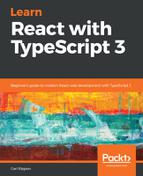Abstract classes are a special type of class that can only be inherited from and not instantiated. They are declared with the abstract keyword, as in the following example:
- We can define a base Product class as follows:
abstract class Product {
name: string;
unitPrice: number;
}
- If we try to create an instance of this, the compiler will complain, as we would expect:

- We can create a more specific usable class for food products by extending Product:
class Food extends Product {
constructor(public bestBefore: Date) {
super();
}
}
- Here, we are adding a bestBefore date in our Food class. We can then create an instance of Food, passing in the bestBefore date:
const bread = new Food(new Date(2019, 6, 1));
Abstract classes can have abstract methods that child classes must implement. Abstract methods are declared with the abstract keyword in front of them, as in the following example:
- Let's add an abstract method to our base Product class:
abstract class Product {
name: string;
unitPrice: number;
abstract delete(): void;
}
- After we add the abstract method, the compiler immediately complains about our Food class because it doesn't implement the delete method:

- So, let's fix this and implement the delete method:
class Food extends Product {
deleted: boolean;
constructor(public bestBefore: Date) {
super();
}
delete() {
this.deleted = false;
}
}
